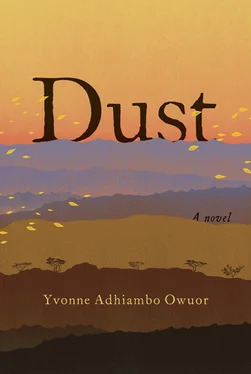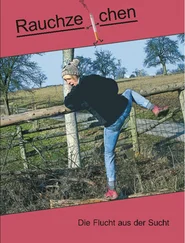Nyipir gestures toward the coffin. “Bring him back to life.”
The Trader grabs Nyipir’s forearm. Nyipir’s muscles shudder and then relax. He emits a groan.
The Trader leans close. “I met a friend of the family.”
“Who?”
“A d’abeela .”
“What do you want?”
The Trader pulls out coffee beans and shrugs. “Ka-ha-wa?”
Nyipir looks away.
“Truuut — rat-a-tat-tat,” sings the Trader.
Nyipir answers, “I don’t trade anymore.”
“It’s what I want.”
“I don’t trade.”
Silence.
“I can help.”
“What?”
“Eliminate poisonous snakes that infest a quiet house.”
Silence.
“He’ll leave.”
The Trader looks over at Wuoth Ogik.
“Maybe. Akai is frightened of snakes. The venom … could kill her.…”
“He’ll leave.”
“When?”
Nyipir shifts.
The Trader leans his head against his shoulder. “I can make watering holes forget everything.”
Nyipir mutters, “It’s not like that.”
“As you say.”
“What do you want?”
The Trader snorts, “You were a terrifying man before. Now we only pray for you.”
Nyipir glares.
The Trader says, “Costs much to make a man disappear.”
“I paid.”
“A discounted rate.”
Nyipir exhales; his nose flares; he grits his teeth. “I’m grateful.”
The Trader smiles. “So?” He extends a quarter-filled pot. “I’ve added four drops of clove oil and a cinnamon twig. Try it. Clears the head, helps the mind to retrieve its silence.” A ravening grin. “A great feat, to cause a man or men to disappear— paff —or bring them back!”
“What do you want?” Nyipir’s eyes blink rapidly, and his hands shake.
“Very little,” says the Trader.
Outside, a small wind eases past a thorn tree. Inside, the scent of ghee, smoke, and warm leather. It saturates skin, cloth, blood, grime, and sadness. In the dark, Galgalu slithers into the room where Isaiah snores. In his hand, the Trader’s potion — it is shaped like a fist-sized incense lump. Simple instructions given with a glimmer in the eye: Light this in the room where he sleeps. You, you must leave when the smoke rises .
“What’s this?” Galgalu asked.
“A gift for the home,” the Trader said, and giggled.
Lump in one hand, Galgalu watches Isaiah’s chest rise and fall. He wonders at the haplessness of sleeping souls. Swallowing saliva. “Isaiah?” Galgalu tugs at the coverlet with the free hand. “Isaiah!” A hiss.
Isaiah jumps awake, stands naked, swaying. “What is it?”
Galgalu puts a finger to his mouth, listens for something outside, and then throws Isaiah’s trousers at him. “Go.” Tosses his shirt.
“You can’t just come in here and …”
“Leave.”
“Why?”
“Go to Nairobi. Find Ajany. She’ll tell you everything. Go.” Desperation. “Save your life.”
“I’ll leave after I speak to the old man.” Isaiah pulls on the unclean shirt, khakis.
“Wait and die, Isaiah,” Galgalu says, lucid. And then, “You want to die? Stay!” Galgalu pushes Isaiah’s chest. “Go! Go! Go!”
Isaiah grabs his things, more shaken by Galgalu’s urgent gestures than by what he’s saying. Immortality’s veil cracks. Icy fright. He is so far away from home.
Galgalu spits resentment: “You open quiet graves and think the dead won’t also look for you?” He shoves Isaiah’s chest. “Go, with your sickness.”
“Why not just kill me?” asks Isaiah.
“Too much work.” The death nugget feels hot within his palms.
Isaiah squeezes his eyes shut. In between wondering and deciding, an image shows up: the death-destruction-fear-night-of-death goddess Kalaratri. A shudder slithers through Isaiah’s body. He succumbs. “How do I leave? Here, I’ve got a map.”
Galgalu rolls his eyes. “Leave the house, walk a straight line from the door. Don’t stop till you see many, many black rocks that are the shape of many, many breasts. Wait there. I’ll come with the cows. Listen for bells. Go. In Nairobi, find Ali Dida Hada. Police headquarters. In your map, write ‘Ali Dida Hada.’ ”
“Who’s he?”
“Police. He was looking for Bolton.”
“What?”
“Yes.”
Galgalu disintegrates into darkness, leaving Isaiah alone after he has tossed the poisoned lump onto the bookshelf.
Fear’s moldering stench. Isaiah listens for movement. Is this an ambush? The water tank creaks. Isaiah craves a place where tea shops sit next door to Covent Garden ballets. He misses the disembodied voice nagging, “Mind the gap.” He wants to hear Christmas bells and dull sermons from apologetic vicars. Isaiah grabs his bag, stuffs in some books, stares at the night, greedy to live. Terrifying Kalaratri. She is also a mother. So he prays. Help me! He is not running away. Help me, Kalaratri . Needing to live, promising to live.
THE LAND’S ROCKS CANNOT DECIDE WHAT COLOR TO BE. THE splendid Mount Kulal is violet, then a pink-edged blue. An oryx herd gallivants and leaps. Someone’s scattered camels huddle, and a weaver colony strain the branches of an acacia, chattering with intent. The morning stillness enhances desert murmurs. Isaiah has walked for exactly four days, using the landmarks Galgalu had crafted on the ground. The long, brown, beaded gourd of milk that Galgalu had also left behind dangles from his wrist.
Isaiah had written out Ali Dida Hada on his map. He had also transferred Galgalu’s earth map, created when Galgalu met him that morning. With a thin stick, Galgalu had pointed to the sentinel to their left, “Kulal.” He indicated a sketched area of earth. An “X.” And he used the tip of the stick to move black pebbles. “You walk here … here … here …”
Lines and holes on the ground, a curve to show a laga , a hump for a mountain, small holes to indicate valleys, ridges, watering holes, and sand dunes. Galgalu said “North Horr, OK?” and went quiet.
“OK,” Isaiah replied.
He has retraced the earth map to the hum of flies. Such insects. Horrible heat.
He wanted to stay close to another human being, but he was too embarrassed to plead for Galgalu’s company. “What’s the name of God here?” Isaiah asked instead.
“Sometimes Waaqa, sometimes Akuj.” Galgalu’s finger pointed upward, and then swept in all the directions of the world. The sky was a dome over everything.
Galgalu tossed his herding stick at Isaiah.
Isaiah gave it back. “Yours.”
Galgalu thrust it at him.
A hesitation. Isaiah grasped it. A nod.
They turned their backs on each other, stepped in opposite directions.
Isaiah struck out, dry-mouthed, wet-palmed, walked as if he were being chased, glancing back every few meters along pathways with panoramic views of sculpted volcanic disarray and scattered boulders of all shades and sizes. Mount Kulal to the left , he told himself. A burst of yellow and black first alarms and then amazes him. It soars skyward, lands on a flat-headed tree, where it spreads out its wings and, like a butterfly, flitters: a supernal bird. Then, at night, the stars. A discovery: here, the moon was the other way round. He had lost his north. Think, Isaiah . He was startled by his own voice. He licked dry, cracking lips. He walked on soft, crumbling sand. Then hard rock. Sand again. Pebbles. Treacly sweat, scented with salt. The milk became a tart paste. Isaiah chewed it down anyway.
A slender red line lacerates the sky. A night insect stings Isaiah’s face. He scratches the place. A lone jackal watches him, lets him pass, golden gaze puzzled. Small blue insects get a free ride on Isaiah’s body. The silence. Old presences appear, like the floral perfume that a woman he loved used to wear. Delicate, hopeful, like tender dreaming. He wonders again why he still lives. He reads the new sky, tests wind direction and the position of stars. Finds pattern and rhythm. God-roamed-land. He might start singing litanies to nomadic deities. Later, dog-tired and fiercely fed up with loneliness, he just stops walking, sits down dust drenched, curls into himself, and sleeps.
Читать дальше











